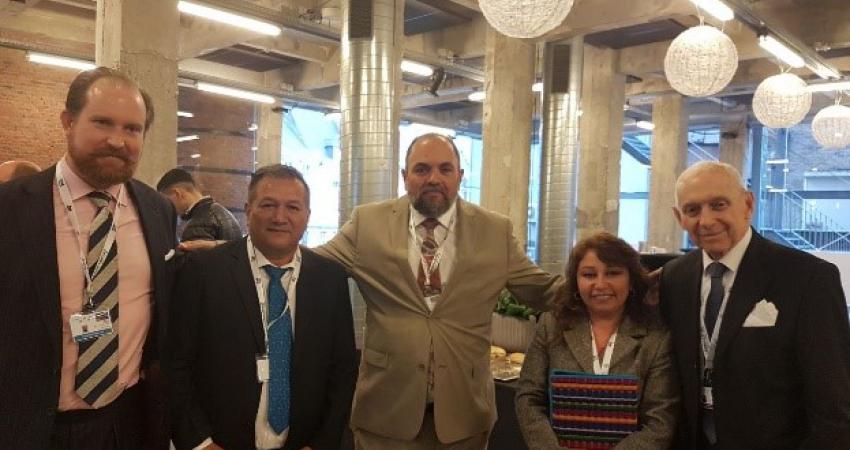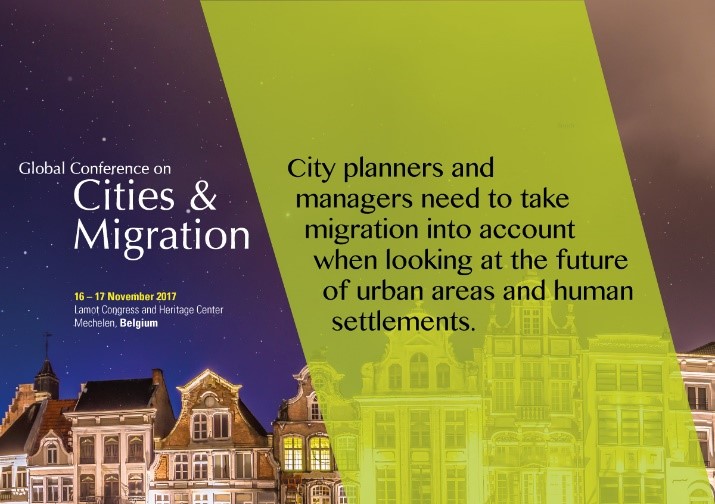Five local governments from Mesoamerica compromised in working towards better migration governance in the Global Conference on Cities and Migration

Belgium, 17 November 2017. The Bureau of Population, Refugees and Migration of the Department of State’s support for IOM Mesoamerica Program has strengthened the capacity and interest of local governments in working towards better migration management throughout Central America.
The Program staff secured independent funding for five mayors from Central America to attend and contribute to the Global Conference on Cities and Migration (16-17 November, 2017) in Mechelen, Belgium. From Costa Rica, Gilbert Jiménez, mayor from Desamparados and Juan Bosco Acevedo, mayor from Upala exposed their experiences working in close collaboration with IOM Costa Rica. Desamparados and Upala are two of the municipalities that receive the most migrants in Costa Rica.
Glenda De León, representative of the Community of Municipalities of Quetzaltenango, Guatemala, stated: "Migrant information hubs, run by municipalities and started with Mesoamerica Program support, are crucial for informing migrants about their rights, options, dangers of irregular migration and access to services”.
This was an opportunity for states to commit to a unifying framework on all aspects of international migration, integrating humanitarian and development work, and based on human rights towards 2018 when they are called to endorse the first Global Compact for Safe, Orderly and Regular Migration (GCM) in 2018.
 Local authorities made important contributions towards the preparation of this agreement, particularly through innovative and more effective approaches to urban governance that accounts for greater diversity, including migration policies for inclusive growth.
Local authorities made important contributions towards the preparation of this agreement, particularly through innovative and more effective approaches to urban governance that accounts for greater diversity, including migration policies for inclusive growth.
As panelists and moderators, mayors from Central America, presented some of the best practices achieved with Mesoamerica Program support. Areas they emphasized included reducing irregular migration drivers, informing potential and actual migrants through municipal migrant information hubs, working against smuggling and trafficking, and incorporating migration in risk reduction and crisis response.
These pragmatic contributions were integrated in the Mechelen Declaration of 16th November, presented as an input for the Global Compact on Migration.
 IOM Costa Rica, represented by its Chief of Mission Roeland de Wilde, organized a side event on implementation of the Migrants in Countries in Crisis recommendations in Mesoamerica. The side event was initially for Central America, but expanded to include mayors from Ecuador, as well as representatives of the municipalities of Mexico City and Sao Paolo.
IOM Costa Rica, represented by its Chief of Mission Roeland de Wilde, organized a side event on implementation of the Migrants in Countries in Crisis recommendations in Mesoamerica. The side event was initially for Central America, but expanded to include mayors from Ecuador, as well as representatives of the municipalities of Mexico City and Sao Paolo.
This generated inputs that were included in the Mechelen Declaration as well as a commitment amongst participants to collaborate with each other on implementing MICIC guidelines and on generating economic conditions to reduce irregular, high-risk migration.
The Mesoamerica Program is financed by the Bureau of Population, Refugees and Migration of the Department of State of the United States of America, with the objective of promoting regular, safe and orderly migration in Mesoamerica, ensuring the human rights protection of migrants.